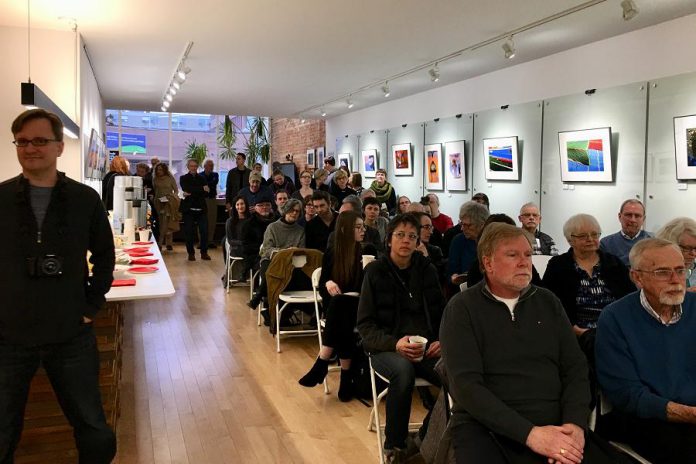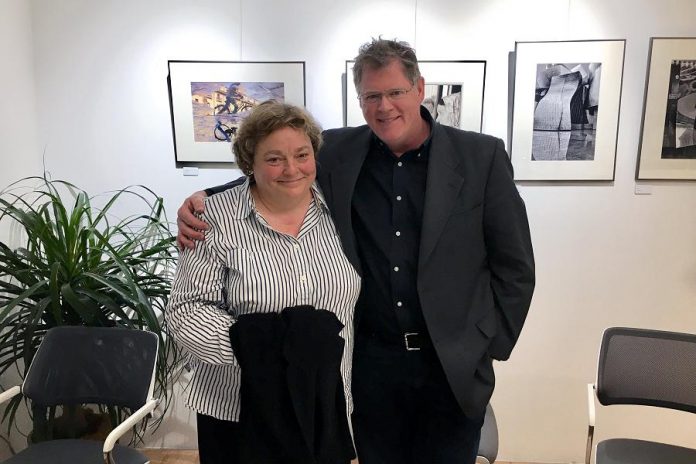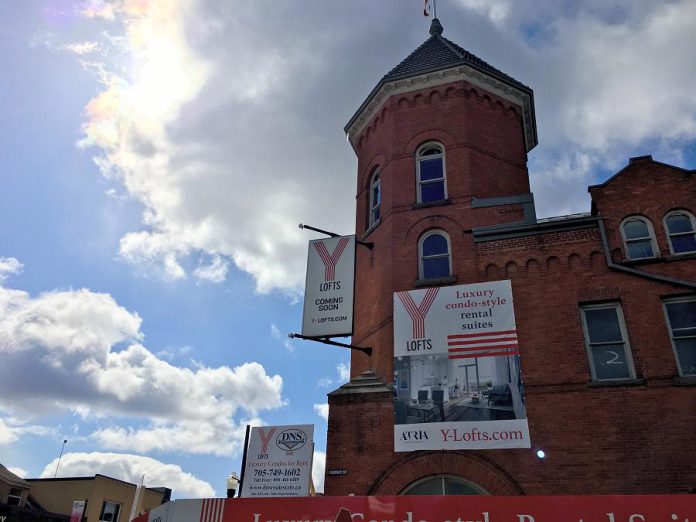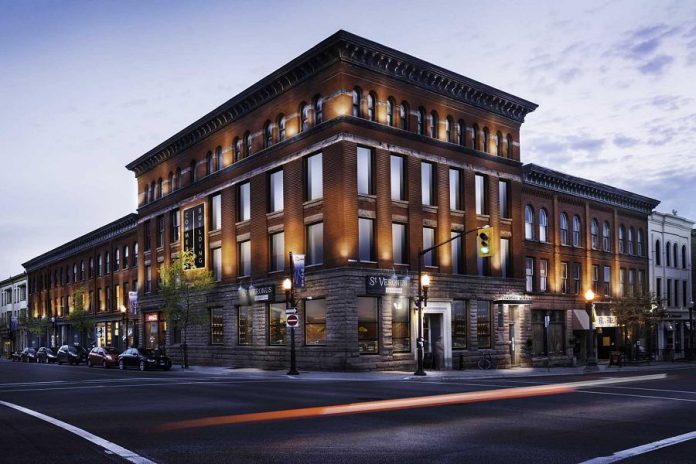
Developers are evil. And the only way to combat them is to train as a Navy SEAL and employ military-style tactics to seek out, destroy, and remove them from the community, joked Erik Hanson, the City’s Heritage Resources Coordinator.
Hanson was speaking to a full house at Lett Architects on Simcoe Street, at the Electric City Culture Council (EC3) discussion last night (April 11) on how to ensure that Peterborough’s arts community and heritage assets are preserved as a central aspect of the city’s identity.
The crowd of about 75 arts and heritage enthusiasts included at least one local developer: realtor/developer Paul Bennett, who recently took over the historic Braund building at the corner of Water and Hunter streets and has not announced any plans for the building which houses many artists and small businesses, but is replacing the windows.
The other speaker, well-known “mission-driven” Toronto developer Margie Zeidler, president of Urbanspace Property Group, shared insights on developing one of the first workplace commons at 401 Richmond back in 1994 when she was able to buy the building at $8 per square foot.

Zeidler said the climate for greed means that the best route to protect and create artist spaces can be with the preservation of heritage buildings and the low-cost spaces they can provide.
Zeidler, who was born in Peterborough, didn’t sugarcoat her answer when asked how to encourage developers to invest in the arts community and heritage properties.
“I don’t know how to get developers interested in arts and/or heritage,” she said. “Not many developers are interested in much beyond their financial pro formas. Sadly, we are in an age of unprecedented greed and because real estate has been one of the big factors in wealth creation, there isn’t much of an incentive to work very hard to do anything ‘extra’. Certainly not in Toronto, anyway.
“The only real way to make sure there are spaces for artists is to form a not-for-profit group that will have that as their mission (like Artscape). I find it is only in tough markets where it is hard to find tenants that developers get a bit more creative. I think the best you can do is find developers that already have these leanings and encourage them.”
Zeidler said that although the 401 is run as a for-profit, it is “looking less and less like that every day.”

It is rare to see capitalism do something good for the public commons — yet the onus for preservation is on the private sector. Zeidler said that heritage protection only happens when there are strong rules in place that politicians can’t meddle with. She also suggests organizing volunteers for a Peterborough chapter under the Architectural Conservancy of Ontario.
She said they learned many lessons when developing 401 Richmond, but the principles were built around the “three Cs” — community, culture and commerce — and how mixing these three together benefits everyone and can create “cross-subsidies” where one tenant is able to pay market rent while another may not.
Part of the 401 redevelopment included using the courtyard as the playground for the building’s daycare centre. Zeidler said, “The children’s voices help remind us why we are trying to create a better world.” This new “workplace commons” was so successful, the province commissioned a report to see if it could be replicated.
She said they also learned that supportive work environments are crucial for artists and smaller entrepreneurs for success. Many entrepreneurs, including artists, livelihoods can hinge on being able to acquire cheap space. And “artists always pay their rent,” she said.
Hanson noted that studies show most business owners have a sense of pride in being near heritage buildings. He also said that heritage can be an economic driver for any downtown.
As Hanson talked about how heritage designations are made (there are 128 designated buildings in the city, and also a Heritage Conservation District in the Avenues) and about the progress that Peterborough has made over the last 15 years, he said the City has been good at adaptive re-use especially with housing projects.
“We see so many beautiful examples of adaptive re-use,” he said, noting the Post Office redevelopment on Charlotte Street and others including the Y-Lofts, which was “more than 10 years in the making.”

Hanson also noted that the City’s updated Official Plan will include heritage designations and he encourages everyone to provide input (there is a survey online right now.)
Beyond the fact that these older buildings can provide cheaper rental spaces, they are also more environmentally friendly and have lower operational costs.
“The greenest building is the one already standing,” said Hanson, adding it is only through maintaining current buildings that we will be able to meet our goals with the Paris climate agreement.
Older buildings also have the lowest operating costs because of the way buildings were originally built for heating and cooling efficiency without controlled air, said Zeidler, adding that restoration provides new, local jobs, and skills.
“Buildings built after the Second World War are inherently more wasteful than the ones that were built before,” she said, adding that in the shoulder seasons at 401 they simply open up the windows. “Most new windows start to fail within 20 years. And we have windows that are 120 years old that have been restored and are on their way to last for another 120 years.
“When you demolish an old building, it’s not just a loss of a building, it’s a loss of memory and how we were once able to do fine and beautiful things.”
EC3 will be hosting planning charrettes (workshops) to engage citizens in updating the City’s Official Plan in the coming months. Stay tuned to www.ecthree.org.


























